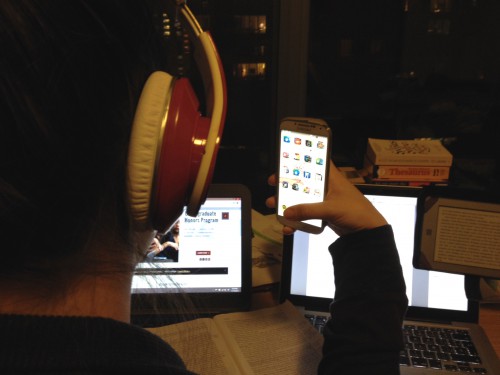The Cambridge Forum hosted a discussion about “The App Generation,” a book by Howard Gardner and Katie Davis on their research of how technology has changed young people.
Over the last seven years, Gardner and Davis held hundreds of interviews with adolescents, students, and professionals to collect information on the relationship between the digital world and their lives.
Gardner is a professor at Harvard University, where he studied as well. “The App Generation” is Gardner’s 29th published novel, and his works have been translated to over 30 languages. Recognized for his theory of “Multiple Intelligence,” he has twice been named one of the top 100 most influential public intellectuals worldwide.
Katie Davis is an assistant professor at University of Washington, where she studies the role of digital technology in adolescents’ lives. Davis also works for MTV ‘s “Digital Abuse Campaign.” Both authors worked for Harvard’s “Project Zero,” where they collected the research used for their book.
“It is our argument in the book that young people today are not just immersed in apps,” Davis said, “but that they have come to see their world as a collection of apps, and in fact their lives as a string of ordered apps. We explore the idea of ‘app mentality.’”
Two terms coined by Gardner and Davis are “app-enabled” and “app-dependent” to describe how people use these mobile applications daily. App-enabled is for those who use them to enhance their daily lives, such as using productivity apps to keep in mind tasks. A dependency is created when individuals begin to replace face-to-face interactions with solely social media communication to talk to friends and family. An app-dependent person may also overuse them in hopes to express themselves, rather than taking action in “real life.”

“We use the term ‘app-directed’ for kids today,” Gardner said. “Rather than looking at the past, kids are just spending their time looking at their devices when they could be looking inside themselves or things other people are doing. We also focused on crises faced by young people as they are coming to age.” Gardner and Davis explored psychologist Erik Erikson’s theories of identity crisis, intimacy versus isolation, and generativity versus isolation.
Their research began by interviewing teachers and asking them how they have witnessed their students change over time. Gardner and Davis found that technology was almost always a part of their answers. They then interviewed focus groups, such as camp directors, art teachers, and a group of psychoanalysts. The information they gathered was from about 100 adults and over 2,000 adolescents. Artistic projects from current students were also compared to one from previous years to note if there was any change Gardner and Davis used three domains (or ‘I’s’) to discuss their research: identity, intimacy, and imagination.
“Identities that people seek today are increasingly external oriented,” Davis said. “They spend a tremendous amount of time crafting and creating a desirable image of themselves that is orientated to particular audiences, both real and imagined.” She compared this sort of act of “branding oneself” to how apps use certain logos and images to appeal to users.
“One effect of this is the diminishing of internal life. That is the reflection of our feelings, personal values, goals, and desires in life.”
For intimacy, they found although social networks keep an organized list of all your “friends” and therefore may increase interactions, young people usually don’t tend to have deep, personal relationships with a number comparable to their followers on Twitter or Facebook. The Internet has provided a way to express your thoughts without having to face people directly, reducing one’s vulnerability.
“The danger of this is when apps are used to replace personal relationships rather than augmenting them,” Davis said.
From the millions of apps available for download, many are geared to allow people to create art. However, Gardner and Davis question how much this stimulates creativity, as ones “imagination” is limited to the certain color palettes, filters, brushes, and other options that the app designer programmed.
From all this, Gardner explained that they came up with the term “superapp,” which stems from people’s idea that life should contain shortcuts and be as ordered as the activities they perform through their digital devices.
“There is a tendency to think of life nowadays that it is one ordered step after another,” he said. “It would be wrong to pin this down on digital media, and it certainly isn’t unique to our time, but if you think of your daily life as being a series of apps, it is more difficult to think of a life decision as being of a different flavor.”













